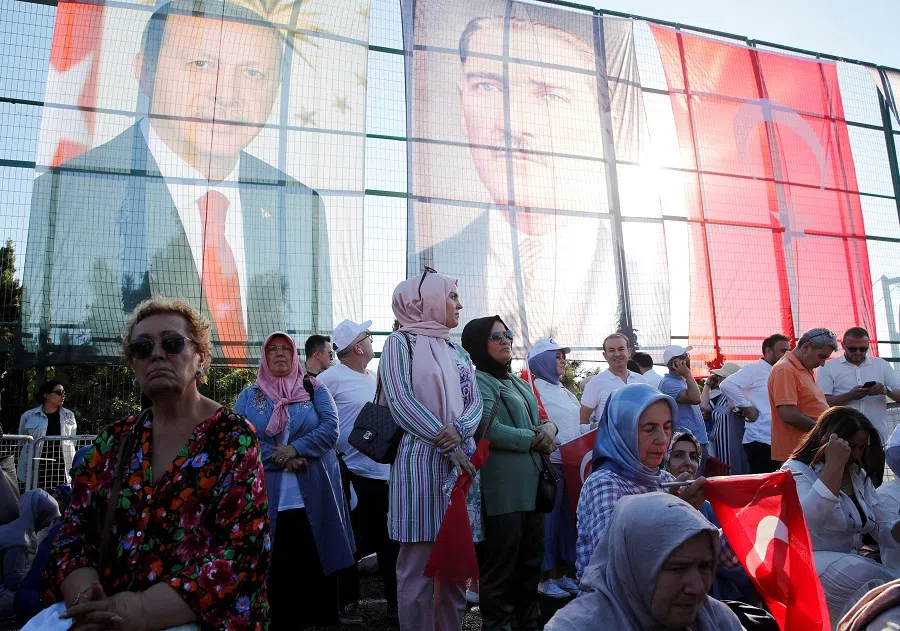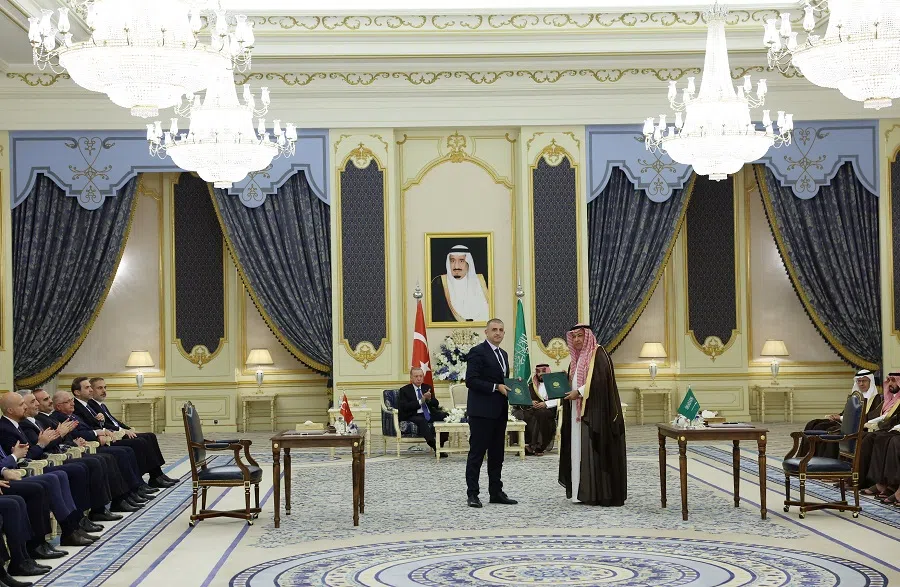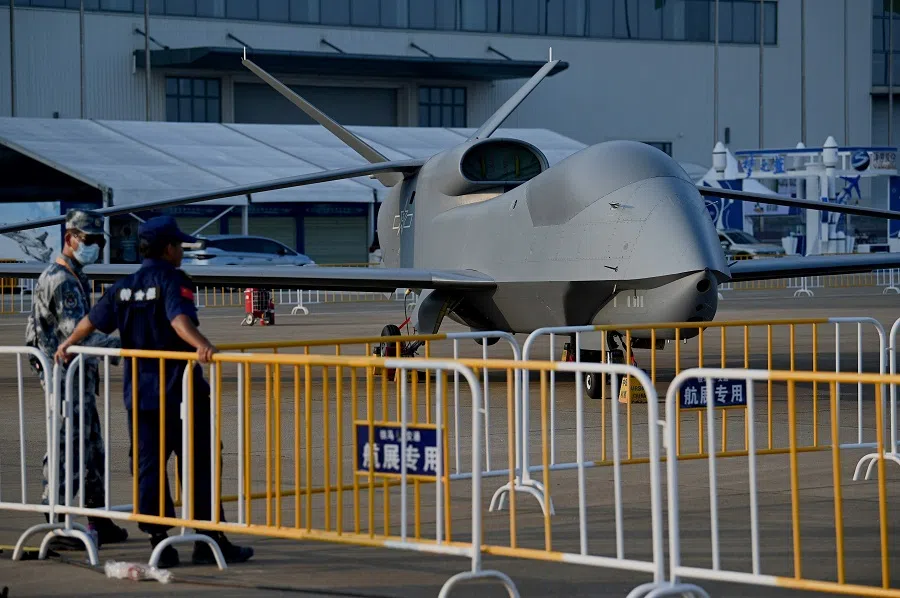Ankara's drone diplomacy in the Gulf complicates China's regional calculations
When Turkish President Recep Tayyip Erdoğan headed to the Gulf last week seeking investments, he had a formidable bargaining chip - drone diplomacy. The top-of-the-line Turkish combat UAV, the Akinci, is much sought-after in Gulf states such as Saudi Arabia. China may be worried, as this development could threaten its leading position in the field and hinder its economic and diplomatic offensive in the Middle East.

Turkish President Recep Tayyip Erdoğan embarked on a significant three-leg Gulf state visit, including stops in Saudi Arabia, Qatar and the United Arab Emirates (UAE). This visit took place against the backdrop of Turkey's struggling economy, marked by soaring inflation, a plummeting currency and a staggering current account deficit, which had reached US$7.9 billion in May.
Erdoğan's all-out investment blitz
In a bold 360-degree effort to secure the country's stability, Turkey is leaving no stone unturned in attracting economic cooperation and investments. With a strategic eye to the east, Ankara is eager to lure more Chinese investments while also turning westward to deepen integration with the European market.
At the same time, the recent diplomatic rapprochement with Riyadh and Abu Dhabi is bringing in much-needed investments from Saudi Arabia and the UAE. These ties, strained during the 2011 Arab Spring, are now on the mend, opening up a floodgate of potential deals. In fact, during Erdoğan's state visit to the UAE, an astounding array of agreements was signed, estimated to be worth a staggering US$50 billion. On the other hand, the visit to Qatar was marked by business as usual, as Erdogan's relations with Doha were already in full swing, with economic and security cooperation thriving.
Beijing is taking note as Ankara vehemently inserts itself in its economic and diplomatic offensive in the Middle East.

However, it is the visit to Saudi Arabia that genuinely stands out, not only in attracting investments and preferential loans but also in reaching a landmark agreement in security cooperation between the two nations. Beijing is taking note as Ankara vehemently inserts itself in its economic and diplomatic offensive in the Middle East.
History is repeating itself in the Gulf, with the Saudis looking to acquire the top-of-the-line Turkish combat UAV, the Akinci.
Drone diplomacy
Realpolitik and changing security architecture in the Middle East pave the way for Erdoğan's trump card: drone diplomacy.
Since the Turkish-made Bayraktar TB2 proved its mettle in tilting the tides of the 44-day Second Nagorno-Karabakh war in 2020, demand for Turkish combat unmanned aerial vehicles (UAVs) has been soaring.
During a 2021 visit to Angola, Nigeria and Togo, Erdoğan proudly stated, "Everywhere I go in Africa, everyone asks about UAVs". History is repeating itself in the Gulf, with the Saudis looking to acquire the top-of-the-line Turkish combat UAV, the Akinci. Already, the Akinci has entered four NATO and two EU member countries' inventories.
The Saudi state news agency reported that Erdoğan and Saudi Crown Prince Mohammed bin Salman attended the signing ceremony between Turkish defence firm Baykar, the maker of Akinci and the ubiquitous Bayraktar TB2, and the Saudi defence ministry. In this respect, Ankara is following the same strategic playbook as Beijing once did in Saudi Arabia. China, having already paved the way by transferring its drone production capabilities to the kingdom, not only sells armed drones but also facilitates technology transfer for localised production.
Turkish sales are increasingly eroding a sizeable part of the Chinese market not only in the Middle East but also across countries from Ethiopia to Poland.

China continues to lead the global market for civilian and armed UAV sales. Nevertheless, Turkey has been gradually chipping away at China's dominant position in the security realm. The US, which has historically been at the forefront of sophisticated armed UAVs since their deployment in scout missions and targeted killings during the war on terror, finds itself trailing behind China and a determined Turkey in the international drone market.
This is down to two factors. The first is price, both Chinese and Turks drones are affordable options for countries looking to build a remote-controlled air force. But even those countries with big budgets, like US allies in the Gulf, have found that price is not the only potential hurdle. So are legal restrictions hindering the sales of US drones, such as the Missile Technology Control Regime. None of that factors into Chinese or Turkish sales.
... from the Turkish point of view, being part of the NATO alliance and jointly producing advanced military equipment with China doesn't seem to be any form of cognitive dissonance.
Formidable competitor to China
Nevertheless, China is now scrambling to stay afloat in the game. Turkish sales are increasingly eroding a sizeable part of the Chinese market not only in the Middle East but also across countries from Ethiopia to Poland. The volume of sales is not the only prize at stake. Pakistan, China's strategic partner in the China-Pakistan Economic Corridor (CPEC) worth roughly US$63 billion, also signed a deal with Turkey to co-produce armed UAVs.
The answer from Beijing to the rising encroachment of Ankara in its top position in the market share for armed drones is complicated by the fact that China is expanding its Belt and Road Initiative (BRI) footprint in Turkey and is even considering joint ventures in the country to localise the production of military equipment including UAVs. At the same time from the Turkish point of view, being part of the NATO alliance and jointly producing advanced military equipment with China doesn't seem to be any form of cognitive dissonance. Turkey's aerial defence system utilising the most advanced Russian missile defence system S-400 Triumph is an illustration of such thinking.

With the recent Saudi agreement and Qatar and Kuwait already enlisted in Baykar's clients' list, the UAE might soon join in acquiring Turkish armed UAVs. While feeling the heat from Turkey's drone exports, China has yet to reveal the outcome of Beijing and Ankara's discussions on defence procurement and production cooperation.
While Turkish drones are constantly in the news, stretching their reach from the Middle East to Eurasia and Africa, the expansion of Turkish private military companies (PMCs) remains unnoticed under the radar. Ankara's prowess extends beyond providing an off-the-shelf air force; they also offer boots on the ground.
While the contest between Beijing and Ankara in the combat drone market takes shape, the global drone arms race escalation is already underway.





